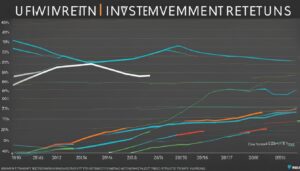Investing in ETFs can be an effective strategy for beginners looking to diversify their investment portfolio and navigate the market. ETFs, or exchange-traded funds, are investment funds that are traded on stock exchanges, offering a diversified portfolio of assets. They provide a low-cost and efficient way for beginners to gain exposure to various asset classes and sectors without having to buy individual stocks or bonds. By utilizing different ETF investment strategies, beginners can achieve their financial goals while minimizing risk and enhancing returns.
Key Takeaways:
- ETFs are an affordable option for beginners to diversify their portfolios.
- They offer instant diversification and high liquidity.
- Popular ETF investment strategies include passive investing, sector rotation, and dividend investing.
- Implementing ETF investment strategies requires careful asset allocation and research.
- Having a long-term perspective is important when investing in ETFs.
The Benefits of ETF Investment for Beginners
ETFs, or exchange-traded funds, offer several benefits for beginner investors. These investment funds provide a low-cost and efficient way for beginners to enter the market and build their investment portfolio. Here are the key advantages of ETF investment:
- Low Cost: Unlike mutual funds, ETFs have lower expense ratios, making them an affordable option for beginners. This cost advantage allows investors to keep more of their returns and minimize expenses.
- Diversification: ETFs hold a basket of different securities, such as stocks, bonds, or commodities. This instant diversification reduces the risk associated with investing in individual stocks or bonds. By spreading their investment across a range of assets, beginners can lower the impact of any single investment’s performance.
- Liquidity: ETFs are traded on stock exchanges, providing high liquidity. Investors have the flexibility to buy or sell shares at any time during market hours, allowing them to react quickly to market movements or take advantage of investment opportunities.
These benefits make ETFs an attractive option for beginner investors who want to start building their investment portfolio with a low-cost, diversified, and liquid investment vehicle.
“ETFs offer beginner investors a low-cost, diversified, and liquid investment vehicle to start building their investment portfolio.”
Popular ETF Investment Strategies for Beginners
When it comes to ETF investment strategies, beginners have a range of options to consider. Here are three popular strategies that can help beginner investors achieve their financial goals:
1. Passive Investing
Passive investing, also known as index investing, involves buying ETFs that replicate the performance of a specific index, such as the S&P 500. This strategy offers broad market exposure and is suitable for investors who want to achieve market returns. By investing in a passive ETF, beginners can benefit from the overall growth of the market without the need for active stock-picking.
2. Sector Rotation
Sector rotation is another popular ETF investment strategy for beginners. This strategy involves investing in ETFs that track specific sectors of the economy, such as technology, healthcare, or energy. By monitoring market cycles and rotating investments between sectors, investors can capitalize on the performance of different sectors during different market conditions. Sector rotation provides an opportunity to potentially outperform the broader market by focusing on sectors that are expected to perform well.
3. Dividend Investing
Dividend investing is a strategy that focuses on investing in ETFs that hold stocks with consistent dividend payments. Dividends are regular cash payments that companies distribute to shareholders as a share of their profits. By investing in dividend-focused ETFs, beginners can generate a steady stream of income while also benefiting from potential stock price appreciation. This strategy can be particularly appealing for investors seeking income and stability in their investment portfolio.
Implementing these popular ETF investment strategies can help beginners navigate the market and achieve their financial goals. Each strategy offers unique advantages and considerations, so it’s important for investors to thoroughly research and understand the specific ETFs they choose to invest in.
Remember, diversification is key when investing in ETFs. By spreading investments across various asset classes, sectors, and dividend-paying stocks, beginners can help manage risk and potentially enhance returns.
Implementing ETF Investment Strategies for Beginners
Implementing ETF investment strategies is crucial for beginners looking to maximize their returns and achieve their financial goals. To effectively implement these strategies, it is important to focus on asset allocation, thorough research, and maintain a long-term perspective.
Determine Risk Tolerance and Investment Goals
Before allocating funds to different ETFs, beginners should first assess their risk tolerance and establish clear investment goals. By understanding how much risk they are willing to take and defining their objectives, beginners can align their ETF investments accordingly.
Asset Allocation for Diversification
Asset allocation is a key component of successful ETF investing. By diversifying investments across various asset classes such as stocks, bonds, and commodities, beginners can mitigate risk and enhance the potential for long-term growth. It is important to determine the appropriate allocation based on individual risk tolerance and investment goals.
Thorough Research of Underlying Assets
Conducting thorough research on the underlying assets of ETFs is vital. Beginners should analyze the historical performance, holdings, and expense ratios of the ETFs they are considering. This research will provide insights into potential risks and returns, enabling informed decision-making and ensuring alignment with investment goals.
Long-Term Perspective
Having a long-term perspective is crucial when implementing ETF investment strategies. Short-term market fluctuations can be unpredictable, but staying focused on long-term goals can help investors navigate volatility and make sound decisions. By maintaining a patient and disciplined approach, beginners can benefit from the potential compounding growth of their ETF investments.
Conclusion
ETF investing offers a compelling conclusion for beginner investors seeking to diversify their portfolios and achieve long-term growth. By incorporating popular ETF investment strategies such as passive investing, sector rotation, and dividend investing, beginners can effectively navigate the market and realize their financial objectives. It is vital for novice investors to possess a clear understanding of their risk tolerance, investment goals, and the underlying assets of the ETFs they intend to invest in. By implementing proper asset allocation, conducting thorough research, and maintaining a long-term perspective, beginners can confidently engage in ETF investing and capitalize on its numerous advantages.
FAQ
What are ETFs?
ETFs, or exchange-traded funds, are investment funds that are traded on stock exchanges, offering a diversified portfolio of assets.
How can ETFs benefit beginner investors?
ETFs have a low cost compared to mutual funds, provide instant diversification, and offer high liquidity, making them an affordable and flexible investment option for beginners.
What are some popular ETF investment strategies for beginners?
Popular ETF investment strategies for beginners include passive investing (index investing), sector rotation, and dividend investing.
How should beginners implement ETF investment strategies?
Beginners should first determine their risk tolerance and investment goals, conduct thorough research on ETFs, regularly monitor their performance, and make necessary adjustments to their portfolio.
Source Links
- https://finance.yahoo.com/news/7-secret-strategies-quick-cash-170008344.html
- https://u.today/anthony-scaramucci-shares-strategy-for-bitcoin-etf
- https://www.crowdfundinsider.com/2024/01/220170-watershed-moment-for-digital-assets-industry-crypto-industry-reacts-to-spot-bitcoin-etf-approvals-by-sec/
Disclaimer
All information on this website is of a general nature. The information is not adapted to conditions that are specific to your person or entity. The information provided can not be considered as personal, professional or legal advice or investment advice to the user.
This website and all information is intended for educational purposes only and does not give financial advice. Signal Mastermind Signals is not a service to provide legal and financial advice; any information provided here is only the personal opinion of the author (not advice or financial advice in any sense, and in the sense of any act, ordinance or law of any country) and must not be used for financial activities. Signal Mastermind Signals does not offer, operate or provide financial, brokerage, commercial or investment services and is not a financial advisor. Rather, Signal Mastermind Signals is an educational site and a platform for exchanging Forex information. Whenever information is disclosed, whether express or implied, about profit or revenue, it is not a guarantee. No method or trading system ensures that it will generate a profit, so always remember that trade can lead to a loss. Trading responsibility, whether resulting in profits or losses, is yours and you must agree not to hold Signal Mastermind Signals or other information providers that are responsible in any way whatsoever. The use of the system means that the user accepts Disclaimer and Terms of Use.
Signal Mastermind Signals is not represented as a registered investment consultant or brokerage dealer nor offers to buy or sell any of the financial instruments mentioned in the service offered.
While Signal Mastermind Signals believes that the content provided is accurate, there are no explicit or implied warranties of accuracy. The information provided is believed to be reliable; Signal Mastermind Signals does not guarantee the accuracy or completeness of the information provided. Third parties refer to Signal Mastermind Signals to provide technology and information if a third party fails, and then there is a risk that the information may be delayed or not delivered at all.
All information and comments contained on this website, including but not limited to, opinions, analyzes, news, prices, research, and general, do not constitute investment advice or an invitation to buy or sell any type of instrument. Signal Mastermind Signals assumes no responsibility for any loss or damage that may result, directly or indirectly, from the use or dependence on such information.
All information contained on this web site is a personal opinion or belief of the author. None of these data is a recommendation or financial advice in any sense, also within the meaning of any commercial act or law. Writers, publishers and affiliates of Signal Mastermind Signals are not responsible for your trading in any way.
The information and opinions contained in the site are provided for information only and for educational reasons, should never be considered as direct or indirect advice to open a trading account and / or invest money in Forex trading with any Forex company . Signal Mastermind Signals assumes no responsibility for any decisions taken by the user to create a merchant account with any of the brokers listed on this website. Anyone who decides to set up a trading account or use the services, free of charge or paid, to any of the Broker companies mentioned on this website, bears full responsibility for their actions.
Any institution that offers a service and is listed on this website, including forex brokers, financial companies and other institutions, is present only for informational purposes. All ratings, ratings, banners, reviews, or other information found for any of the above-mentioned institutions are provided in a strictly objective manner and according to the best possible reflection of the materials on the official website of the company.
Forex/CFD trading is potentially high risk and may not be suitable for all investors. The high level of leverage can work both for and against traders. Before each Forex/CFD investment, you should carefully consider your goals, past experience and risk level. The opinions and data contained on this site should not be considered as suggestions or advice for the sale or purchase of currency or other instruments. Past results do not show or guarantee future results.
Neither Signal Mastermind Signals nor its affiliates ensure the accuracy of the content provided on this Site. You explicitly agree that viewing, visiting or using this website is at your own risk.




